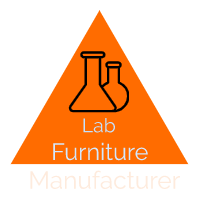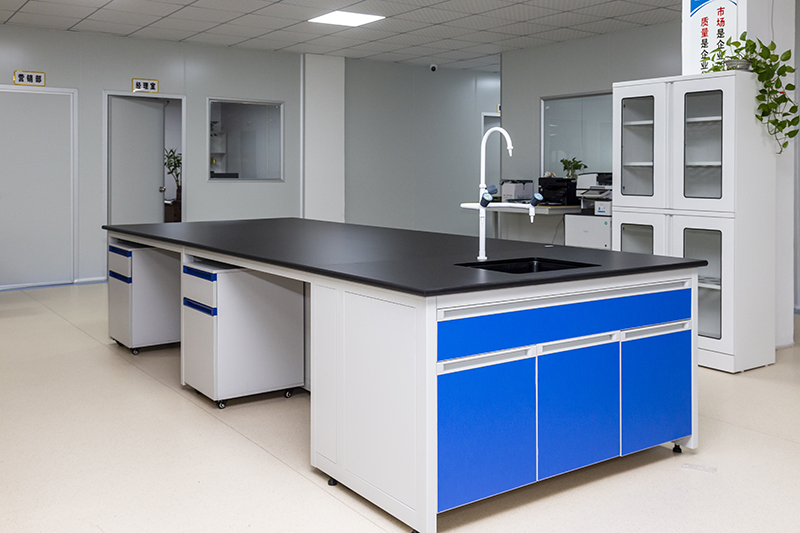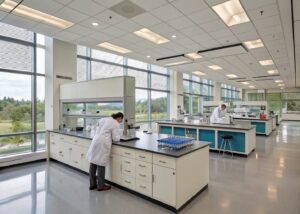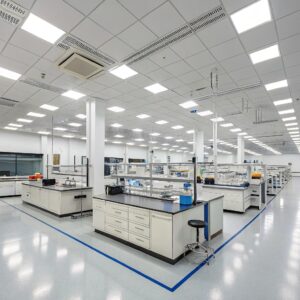Table of Contents
Choosing the right lab workbench top is one of the most critical decisions when outfitting a laboratory. Several factors come into play, such as the types of chemicals being used, the size of the workbench, and your budget.
In this post, we’ll explore the various types of laboratory workbench tops and provide guidance on selecting the best one for your lab needs.
Types of Lab Workbenches
Lab workbenches come in a wide range of styles, each tailored for specific tasks or environments. One of the most common materials for lab workbench tops is epoxy resin, known for its durability and chemical resistance. Below, we’ll briefly cover the different lab workbench types and their typical applications.
Standard Lab Tables
These are the most basic workbenches, often used to hold instruments or as general-purpose lab tables.
Mobile Workbenches
Designed with drawers and wheels, these workbenches are easily movable and ideal for labs requiring flexibility.
Wall-Mounted Workbenches
These space-saving benches are mounted to the wall, typically equipped with shelving for added storage. They offer excellent versatility in smaller lab spaces.
Lab Island Tables
Usually made of metal, these workbenches are ergonomically designed and resistant to chemicals and abrasion, making them a popular choice for demanding lab environments.
Lab Workbenches with Sinks
Common in wet labs and essential for experiments involving water, these benches often come with reagent racks and water faucets.
These are just a few examples; as we dive deeper, we’ll explore other workbench types and their suitability for different lab environments.
Materials Used for Lab Workbenches
Selecting the right material for your lab workbench top is essential for both functionality and durability. Here’s a look at the most popular materials and their applications:
Phenolic Resin
Phenolic resin workbench tops are ideal for labs where maintaining a contamination-free environment is critical. These tops are resistant to moisture, chemicals, and germs, making them an excellent choice for chemical labs.
Epoxy Resin
Epoxy resin is durable and non-porous, making it highly resistant to moisture, heat, and chemicals. This material is perfect for labs that handle high contaminants or wet environments. Epoxy resin workbenches are also commonly used around sinks due to their water resistance.
Stainless Steel
Stainless steel is incredibly durable and easy to clean, with anti-microbial properties that make it ideal for hygienic lab settings. It comes in both polished and brushed varieties, offering a sleek, professional appearance.
High-Pressure Plastic Laminate
This material is a more affordable option, made from melamine, phenolic resin, and wood fibers. High-pressure laminate workbench tops are suitable for dry working conditions, such as in technology or electronics labs.
Ceramic
Known for its waterproof and non-porous properties, ceramic workbench tops resist stains and are easy to clean, making them a premium choice in luxury lab environments.
Polypropylene
A thermoplastic polymer, polypropylene is highly resistant to acids, bases, and other harsh chemicals. It’s ideal for labs that deal with corrosive materials.
Edge-Grain Maple (Butcher Block)
Edge-grain maple tops are great for labs where chemicals are not a concern. They repel alcohol and are commonly used in biological and food labs.
Granite
Granite is a natural stone that offers exceptional strength, durability, and resistance to chemicals and stains. It’s a great choice for high-end labs where both appearance and durability are a priority.
How to Choose the Right Workbench for Your Lab Environment
When selecting a lab workbench top, the key question is: what type of work will be performed? Different lab environments have unique requirements, and the right workbench top will vary accordingly.
- Biology Labs: In biology labs, where experiments often involve water, a stainless steel workbench with a sink, reagent rack, and water faucet is a must.
- High-Heat and Chemical Labs: For labs that deal with high temperatures, corrosive chemicals, or glassware, opt for durable surfaces like epoxy resin or stainless steel that can withstand these conditions.
- Dry Labs: For environments that require electrical work or open space, such as physics labs, a flat marble workbench with ample storage is ideal.
- Pharmaceutical Labs: Labs performing heavy chemical testing should use workbenches with chemical-resistant surfaces like epoxy resin or stainless steel.
- Hospital Labs: Non-contamination is the top priority in hospital labs. Choose workbench tops that can withstand constant cleaning, such as stainless steel or epoxy resin.
Workbench Top Selection by Industry
- Pharmaceutical Industry: Epoxy resin is a popular choice due to its ability to withstand high temperatures and chemical exposure. Stainless steel is also frequently used, as it meets strict hygiene standards.
- Biotechnology Labs: Phenolic resin and epoxy resin are both excellent choices for biotech labs, as they are easy to sterilize and resistant to harsh chemicals.
- Educational Labs: Epoxy resin tops are well-suited for student labs due to their durability and chemical resistance.
- Hospital Labs: Stainless steel and epoxy resin are commonly used for their ease of cleaning and resistance to chemicals.
- Animal and Plant Science Labs: Phenolic resin tops are ideal, as they provide a sturdy, non-porous surface that resists chemical damage and is easy to clean.
- Disease Control Centers: Epoxy resin workbenches offer a smooth, non-porous surface that’s easy to disinfect, which is critical in disease control labs.
- Environmental Testing Labs: An epoxy resin top is also a top choice for environmental testing labs due to its versatility and resistance to harsh chemicals.
Conclusion
Choosing the right lab workbench top is essential for creating a functional and safe workspace. The material you select should not only suit the lab environment but also be durable enough to withstand the unique demands of the work. Whether you opt for epoxy resin, phenolic resin, stainless steel, or another material, making an informed decision will ensure your lab runs efficiently for years to come.




